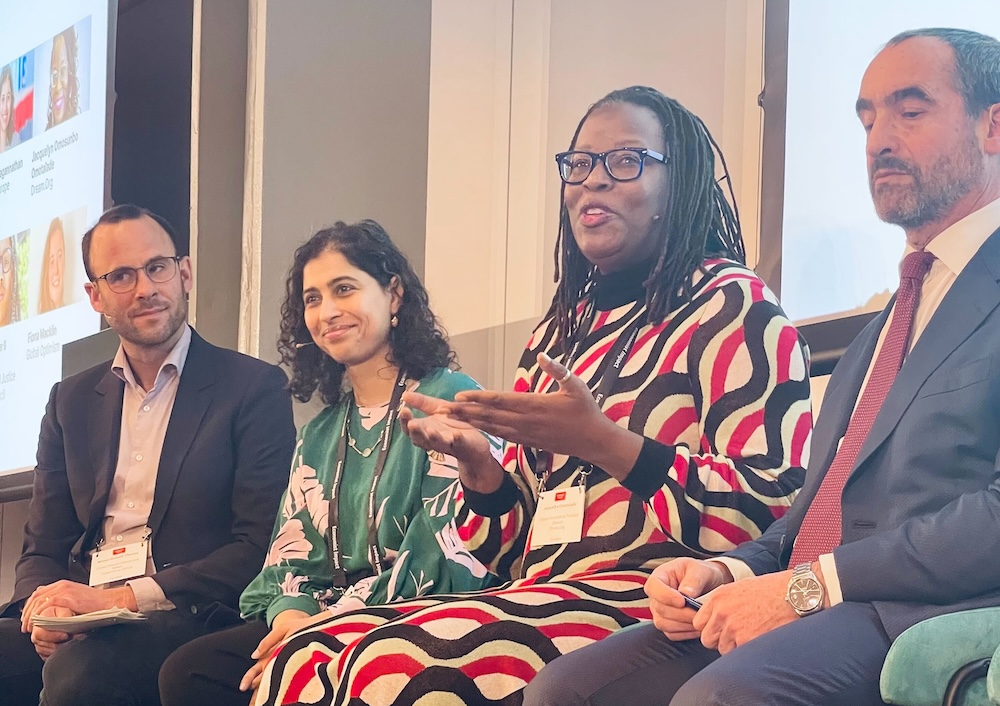Rethinking Finance: Centering Impact Beyond Financial Returns

Authored by Jackie Omotalade
The London Sustainability Conference hosted by The Economist celebrated Sustainability Week, bringing together thought leaders in the most critical time in our fight for climate justice. As the National Director for Climate Investments at Dream.Org, I represented the organization on a panel dedicated to discussing the pivotal clean energy transition. Alongside SEC Neugate, I led Dream.Org in a profound discussion during an investor roundtable, shedding light on the barriers hindering climate investment financing for Black and Brown climate tech entrepreneurs.
Here are my reflections on how we must reimagine finance models to center impact beyond financial returns:
The Economist Panel Participation:
Participating in the panel discussions highlighted the pressing need for a paradigm shift in finance. Beyond simply seeking financial gains, it is imperative to prioritize investments that generate positive social and environmental impact. Dream.Org's commitment to sustainability was echoed as we emphasized the importance of aligning financial goals with broader societal and environmental objectives. The conversations underscored the vital role of impact investing in driving meaningful change and transitioning toward a more sustainable future.
Dream.Org Investor Roundtable:
The investor roundtable provided a platform to delve deeper into the systemic barriers that hinder access to finance for marginalized entrepreneurs. Collaborating with SEC Neugate, we identified the ingrained biases and structural impediments that perpetuate inequality within the investment landscape. It became evident that traditional finance models fail to adequately account for the diverse range of impacts beyond financial returns, neglecting the social and environmental dimensions essential for building a resilient and inclusive economy.
Observations and Insights:
- Capital's Global Nature: The discussions illuminated the global nature of capital flows and the interconnectedness of financial markets. Recognizing that capital knows no borders, there was a shared understanding that addressing pressing global challenges, such as climate change, requires collaboration across geographical boundaries. This realization underscores the importance of fostering international cooperation and coordination in mobilizing investments towards sustainable and impactful initiatives.
- Expanding the Definition of Value: The discussions underscored the need to broaden our definition of value beyond purely financial metrics. True value encompasses social, environmental, and economic considerations, reflecting a holistic understanding of prosperity. By redefining success in finance to include non-financial dimensions, we can unlock opportunities for investments that create sustainable and inclusive outcomes for all stakeholders.
- Empowering Underrepresented Voices: Central to our discussions was the recognition of the importance of amplifying underrepresented voices within the finance and sustainability sectors. Black and Brown entrepreneurs bring unique perspectives and solutions to the table, yet face significant barriers in accessing capital and resources. By fostering inclusive ecosystems that prioritize diversity and equity, we can unleash the full potential of innovation and drive positive societal change.
- Integrating Impact Measurement: Moving forward, it is essential to integrate robust impact measurement frameworks into finance models. By quantifying and transparently reporting on social and environmental outcomes, investors can make informed decisions that align with their values and objectives. Embracing impact measurement not only enhances accountability but also catalyzes the shift toward more sustainable and responsible investment practices.
- Shifting Investment Paradigms: A notable highlight from the panel was the growing interest among a group of investors in shifting investment paradigms towards more sustainable and impactful strategies. This cohort recognizes the imperative of aligning investment decisions with environmental, social, and governance (ESG) principles, prioritizing long-term sustainability over short-term gains. Their willingness to embrace innovative approaches and explore alternative investment models signifies a pivotal moment in reshaping the future of finance toward greater responsibility and purpose.
In conclusion, my reflections from London underscore the urgency of reimagining finance models to center impact beyond financial returns. As we navigate the complex interplay between finance, sustainability, and social equity, it is essential to challenge existing paradigms and embrace innovative approaches that prioritize people and the planet alongside profit. By harnessing the transformative power of finance, we can catalyze positive change and build a more resilient, inclusive, and sustainable future for generations to come.
